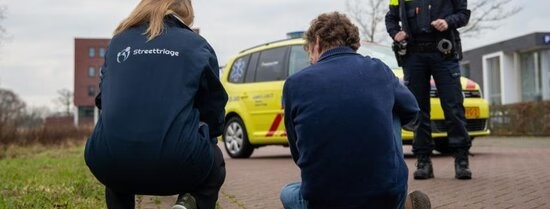Duration: April 2023 – April 2026
Commissioned by: ZonMw
When following discussions about unexplained behaviour in the news and politics, one might get the impression that little has changed since the murder of Els Borst. The number of E33 reports continues to rise, and the police still indicate being deployed too often. However, the reality is more nuanced. Behind the E33 reports is an issue where people in vulnerable situations do not receive the support they need because of a fragmented system. The central question is how we, as a society, deal with people exhibiting unexplained behaviour. This forms the core of the Action Programme "Grip op Onbegrip" (Grip on Misunderstanding).
In April 2023, BE-grip commenced, serving as the national guidance and monitoring network for the Action Programme "Grip op Onbegrip." BE-grip strengthens regional networks focusing on supporting individuals with unexplained behaviour to learn and improve collectively.

Background
The term 'unexplained behaviour' refers to a diverse group of individuals with complex care needs due to a combination of psychological, social, and/or societal issues, including mental health problems, addiction, dementia, or social challenges. Across the Netherlands, fragmentation in care and support systems has resulted in these individuals often not receiving the help they need, which can lead to (perceived) nuisance and safety concerns for both the individual exhibiting the behavior and those around them.
BE-grip strengthens regional networks that focus on providing comprehensive and person-centred support. Since 2016, numerous initiatives have been introduced to enhance support for people with misunderstood behaviour. The evaluation of the previous Misunderstood Behaviour Action Program 2016-2021 from ZonMw (site in Dutch only) showed that these initiatives have helped improve collaboration between stakeholders and fostered more person-centred triage, transport, and care. However, providing appropriate and integrated support remains a significant challenge. In addition to care, attention must be given to prevention—through financial security, suitable housing, aftercare, and destigmatization. This need was also emphasized in a parliamentary inquiry. Furthermore, integrated support requires a shift in thinking and action at all levels, from neighbourhood care workers to national policymakers. To address this, it was recommended to develop systems that manage challenges by facilitating connections across different levels, professional domains, organizational structures, and funding mechanisms.
Action Programma 'Grip op Onbegrip'
The Action Programme 'Grip op Onbegrip' aims to reduce fragmentation and to develop integrated support for individuals with unexplained behaviour. To achieve this, the programme offers (financial) support to regional networks that work together on integrated solutions. These networks consist of professionals from the healthcare, social, and safety sectors, as well as individuals with lived experience and their close relatives.
National BE-grip team
The BE-grip research project plays a key role within this action program. BE-grip supports and monitors collaboration within and between networks working on comprehensive support for people with misunderstood behaviour. This occurs at three levels:
- Within regions: Case guidance, strengthening the role of experts by experience, and improving network cohesion.
- Across regions: Organizing workshops and reflection sessions on challenges such as shared leadership and impact measurement.
- Nationally: Contributing to policy development, knowledge-sharing, and identifying structural barriers.
BE-grip employs reflexive action research (RMA), ensuring that insights from monitoring are directly incorporated into network support. The project is led by a broad consortium of knowledge institutes, umbrella organizations, and client organizations, coordinated by Dr Violet Petit-Steeghs from Erasmus School of Health Policy and Management (ESHPM) and Center of Expertise Phrenos.
Knowledge clips on collaboration challenges in networks
A series of knowledge clips are being developed on learning and improving within networks. The first few videos are available below:
- Making positive impact visible
- Achieving shared leadership
- Connecting with the lived experiences of people with misunderstood behaviour
- Dealing with resource scarcity
- Improving communication in complex environments
- Preventing problems
- Supporting individuals outside the system
Relevant documents (Dutch only)
Team
 dr. Violet Petit-Steeghs
dr. Violet Petit-SteeghsAssistant Professor & Project lead
Email address Prof.dr. Hester van de Bovenkamp
Prof.dr. Hester van de BovenkampFull Professor
 Prof.dr. Roland Bal
Prof.dr. Roland BalFull Professor
 Lizette Krist
Lizette KristPhD
Partners





